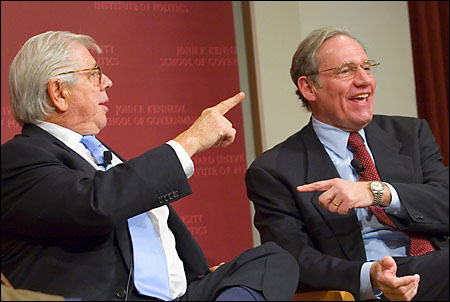Protecting ‘Deep Throat’ and others
Woodward and Bernstein defend anonymous sources in forum appearance

Bob Woodward and Carl Bernstein, who as young reporters broke the Watergate scandal wide open, came together again Monday night (Dec. 5) for a Kennedy School Forum discussion on anonymous sources and journalistic integrity. Described by moderator Alex Jones, director of the Shorenstein Center, as “the most celebrated and admired reporting team in history,” both reporters defended a reporter’s right to keep sources confidential no matter what the circumstances.
“This really is an unbreakable contract unless somebody is dishonest with you,” said Woodward, now assistant managing editor of The Washington Post and author of numerous books including “Bush at War” and “Plan of Attack.” “To get people to give information … that is vital to understanding so people can really see what is going on. You have to make that pledge and that pledge doesn’t have any ifs or speculation attached to it.”

Even in today’s more restrictive climate when reporters, like New York Times reporter Judith Miller, are being sent to jail for not revealing sources, that pact is sacred, said Bernstein, who since leaving the Post in 1977 has authored numerous books and worked for ABC News, Time Magazine, Vanity Fair, and as executive vice president and editor of Voter.com. “As a last resort, I think there is no alternative.”
Woodward and Bernstein raised the standard for investigative reporting and brought legendary status to themselves when, as Washington Post reporters in the early 1970s, they doggedly pursued those responsible for the break-in of the Democratic National Committee headquarters at the Watergate complex and the subsequent cover-up. The investigation ultimately led to the resignation of President Richard Nixon in 1974.
Both men described their ambivalence last spring when their most famous source, “Deep Throat,” the cause of speculation for more than three decades, was revealed as Mark Felt, the number two man in the FBI – a disclosure made by Felt’s family.
“We had some very serious debates between us and with the current editor of the Washington Post Len Downey and Ben Bradlee, our editor on Watergate, about what to do,” said Woodward.
“Our first inclination was no,” said Bernstein. “But by the end of the day, it was apparent to us that we would have no credibility if we were not to confirm it.”
Woodward also responded to criticism, most recently by columnist Frank Rich in the New York Times, that he has become too close to the administration and that, in his most recent book, “Plan of Attack,” he missed the story of the administration’s alleged efforts to mislead Congress and the American people in order to go to war.
But Woodward said he is a reporter rather than a judge. “I’m old school about this. We live in a sound bite culture … what is the conventional wisdom on a book, a personality, a life, a presidency? I don’t think you can reduce it to that.”
The forum was co-sponsored by the Shorenstein Center on the Press, Politics and Public Policy.




